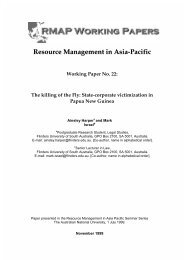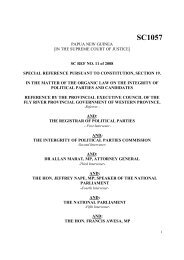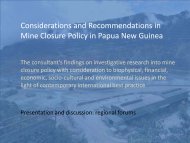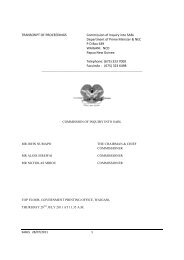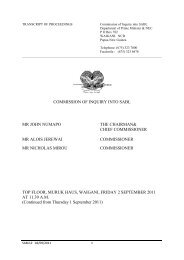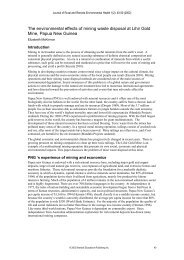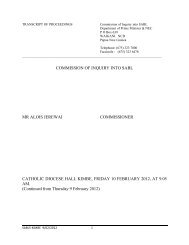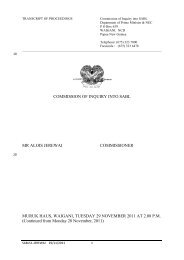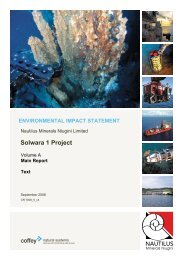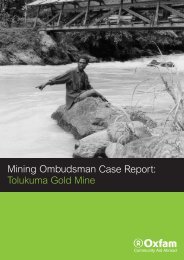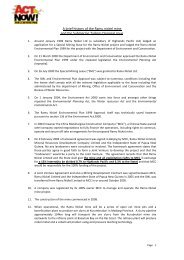Fishy business. The Social Impact of SST.pdf - Act Now!
Fishy business. The Social Impact of SST.pdf - Act Now!
Fishy business. The Social Impact of SST.pdf - Act Now!
You also want an ePaper? Increase the reach of your titles
YUMPU automatically turns print PDFs into web optimized ePapers that Google loves.
esponsibility goes beyond financial obligations to shareholders. A number <strong>of</strong> British companies,fore example, have struck up partnerships with NGO’s that lend their ‘brands’ to these companiesin return for social or environmental monitoring. British American Tobacco (BAT), for example,has brought in consultants <strong>of</strong> all kinds to manage ‘stakeholder dialogues’ with health <strong>of</strong>ficials,farmers, <strong>of</strong>fice workers and others in the many developing countires where they operate. <strong>The</strong>seare voluntary dialogues, and clever marketing strategies as well. In part, too, they are attempts t<strong>of</strong>end <strong>of</strong> more invasive government regulations (<strong>of</strong> the sort known to France and Germany, forexample---because only recently have publicly traded companies in the UK been forced todivulge financially material environmental and social risks). <strong>The</strong> questions such voluntarymeasures raise are really that <strong>of</strong> control, and language. Corporate social responsibility is beingdefined by these companies, just as is the term ‘stakeholder’ ---meaning who exactly constitutes astakeholder in an enterprise? (Would Wewak residents suffering from <strong>SST</strong>’s odour be consideredstakeholders, for example?) <strong>The</strong>se processes are now being systematized by major corporations inthis emergency CSR movement. We have only to recall what philosopher Michael Foucault saidabout organization being a form <strong>of</strong> social control to wonder whether this work should be left tothe companies themselves.Again, this is a positive step. But it may also be a dangerous one. In a recent article on the CSRmovement by law pr<strong>of</strong>essor John M. Conley (Conley 2005), ExxonMobil’s 2003 company reportis cited as an example <strong>of</strong> controlling corporate responsibility away in a form <strong>of</strong> Adam Smithspeak.<strong>The</strong> report says, “’Our activities and those <strong>of</strong> others in private industry deliver economicbenefits and help advance worthwhile societal goals.’” As Conley notes, the report goes on toexplain in the rhetoric <strong>of</strong> engineering that ExxonMobil’s “’wider involvement in society’ will begoverned by ’hard analysis, the rigorously applied management systems’ that mark its coreendeavours. ‘S<strong>of</strong>t’ critics need not apply.”This recalls the interview our team had with Ian Boatwood <strong>of</strong> <strong>SST</strong>, who, in response to aquestion about how they give back to town, said simply,Well, we employ a lot <strong>of</strong> people. A tuna factory like this, there are multipliers out there. Wedo half a million plus <strong>business</strong> in town, we generate all our own power here, we don’t usethe town supply…we are using water for the town supply, though. We throw revenues backto the Water Board and wages going out into the <strong>business</strong> communities, we inject moneyinto the community, we get involved in some sponsorships.When we asked if this meant sporting sponsorships, he said, “No, but I mean we get involved inthe community as much as we can. Our cafeteria buys supplies locally…so it’s…some <strong>of</strong> thelocal <strong>business</strong>es in PNG we buy a lot <strong>of</strong> parts from.”v. RecommendationsWhere there are no regulations in place, some sort <strong>of</strong> the principles <strong>of</strong> best practice shouldapply, so that companies actively seek out community consultation, create the means <strong>of</strong>debating issues with the community, and act in a timely manner to redress identified grievances.WWF has already suggested independent monitoring for environmental and social impacts, andwe especially endorse their suggestion that “a clear framework be set up for responding tonegative social trends with costs to be met jointly by the company and government agencies.”170



